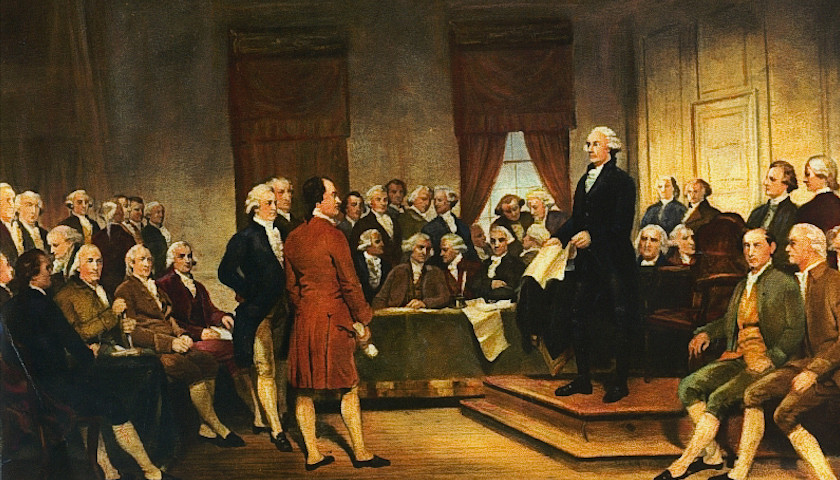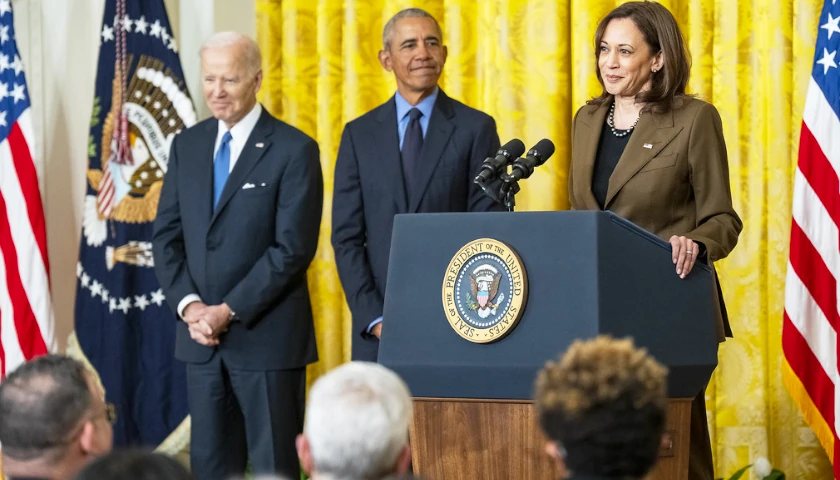by Christopher Roach
The American system does not require unanimity. In fact, its design presumes deep disagreement on matters of morality and policy.
This is why questions like religion are left to individual conscience, and why most policy is left to states or even smaller units, where the law’s touch will not be felt as harshly, because it reflects the more similar values of a smaller group. Finally, regardless of who has the reins of the federal government, the Constitution renders a great deal of substantive activity off limits, as exemplified by the Bill of Rights.
The theory is sensible. Sometimes one side wins, sometimes the other. Because one does not know if his side will be in power or on the receiving end of the power of others, government is limited. Parties agree to limit themselves when they are in power, in exchange for knowing their future opponents are also bound by the same limitations.
This system requires some minimal degree of national unity and national identity to function. One would not agree to share power with hostile strangers; this is why invasions are so feared throughout history. Until recently, our common culture and shared status as Americans limited the extent and depth of political disagreements.
Of course, there were still significant debates. The system broke apart during the Civil War, which arose from a massive contradiction in social systems and economics, but the patterns of American self-government were pieced together reasonably well thereafter. After World War II, an era of consensus began, which permitted a relatively peaceful navigation of the civil rights’ social revolution.
Only with the end of the Cold War have things begun to fragment, once again.
A Fragmented Nation
Deep disagreements about economics, foreign policy, immigration, and national identity rose to the surface after the Cold War ended. Clinton and Bush both sought a more ambitious role in the world, but this received a cool reception from Americans in both parties.
President Obama egged on racial conflict and accelerated the radicalization of middle America. Donald Trump’s surprising victory was a direct consequence. This caused the bureaucracy and the people in charge of both parties to lose all sense of perspective. They hated him and they hated his supporters. Whatever sense of national identity we once shared is almost completely fractured, and every limit on government has begun to dissipate.
The media and elites’ hostility to the old, unifying symbols of the nation, such as the flag and the founders, underscores the erosion of the cultural unity and mutual commitment to sharing power that self-government requires. The low point (to date, at least) can be found in the multiple criminal prosecutions of President Trump, which are taking place in the shadow of Biden’s open and unpunished corruption.
In a real sense, for Republicans at least, elections do not matter. A Republican president will not be able to govern if he aims to change business-as-usual in the slightest, even if he somehow wins. The military-industrial complex, the intelligence agencies, and the millions of federal workers, federal contractors, and beneficiaries will not let him make any meaningful changes. As repeatedly demonstrated in Russiagate and numerous other episodes during Trump’s presidency, the defiance of the permanent bureaucracy and its alignment with the narrow partisan ends of the Democrats visibly undermine the reality of self-government.
No hints of reconciliation have revealed themselves. While there are Quisling Republican Party members happy to see Trump being persecuted, these people do not have a real constituency, and are more properly deemed part of the uniparty, indistinguishable from Democratic partisans.
American Division Defined by Ideology
Unlike other nations’ internal conflicts, ours is chiefly an ideological conflict, which only secondarily includes differences of generations, ethnicity, and geography. In this way, it resembles the serious divisions that characterized Russia before the Bolshevik Revolution, Chile during the transition from the Allende to the Pinochet regimes, and, most saliently, France at the time of the Dreyfus Affair.
These three conflicts ended differently. Russia descended into a bloody and genocidal civil war in 1917 followed by the 75-year rule of the communists. Their persecutions of the Russian people rivaled that of their foreign enemies. This event is worth learning from because the good guys, who were brave and tough and motivated, still lost.
With the blessing of Chile’s conservative middle class and the Catholic Church, the Chilean Army disposed of the lawless Allende with a swift coup in 1973. Rule under Pincohet was harsh, but predictable; the government was mostly agnostic about the private realms of civil society, and its repressions narrowly fell upon the regime’s Marxist enemies. Chile emerged prosperous and orderly when the military regime left power in 1989.
Finally, in France, after decades of conflict and the trial and later vindication of Alfred Dreyfus, the far-left finally got a secure hold of the government it 1905. At this point, it formally adopted secularism and began confiscating the wealth of the Catholic Church and shutting down religious schools. While no longer prone to street battles, the conservative and religious rural population remained hostile and did not accord the new regime much in the way of loyalty and respect.
The French nation became unified during the First World War, but, thereafter, opponents of the secular republic drifted towards extreme nationalist movements, such as Action Francaise. Many in this group would later rally to the collaborationist Vichy Regime. Only after the trauma of World War II, and under the influence of the immensely powerful and charismatic moderate, Charles DeGaulle, did the nation’s unbridgeable left-right divide begin to be healed.
There are no obvious lessons or predictions from these three examples, other than it does not seem likely that the American left and right will achieve a peaceful rapprochement on their own. The various possible paths involve greater and lesser degrees of departure from America’s historical traditions.
The Silent Majority Has Shrunk
To chart our way forward, it helps to eliminate first what not to do. Our own history provides some lessons. During the controversial Vietnam War, the leftist counterculture ran into resistance from what Nixon called the silent majority. While Nixon won a landslide in 1972, reliance on the “silent majority” does not seem realistic anymore. The economic conditions that fostered the large, inherently conservative middle class of the Nixon era are gone.
Family formation and total fertility are taking a nose-dive. Spiritual life and community involvement are at an all-time low. And these trends combine to enhance the relative importance of politics. Right now, neither the left nor the right are in the majority, and thus several close elections have fueled dueling narratives of election rigging and foul play.
We are also missing the types of figures who contributed to national unity in previous eras. While the Congress’s past dignity may be exaggerated, its degraded current state cannot be. The House and Senate have been occupied by geriatric blowhards like Charles Schumer and disreputable hacks like Mitch McConnell for years. There are no “wise men” who can rally both sides of the aisle and command respect from the public. No one is listening to these people, because they are mere observers of what is happening on the outside, among the voters and within the Deep State.
There also does not seem any prospect for a consensus on the alleged crimes of Biden and Trump, regardless of how they are disposed. Both sides will view outcomes through a partisan lens. Biden may very well be the most corrupt president in American history, but even now, after he is caught red-handed heading up a family-grifting operation, his defenders shrug.
In the abstract, most Republicans seem willing to kick a criminal politician out of the party, but the tendentious prosecutions of Trump for contesting an election are simply too much to bear. They command no respect among anyone not already against Trump for partisan reasons.
The left believes its power is permanent, and they might be correct. But even if that is true, a plurality of angry conservatives will not accept their right to rule. Facing a widespread rejection of its legitimacy, the regime will lash out in desperate and unpredictable ways. This is what spectacles like the Biden inauguration’s Green Zone, the National Guard occupying the capitol for weeks, and the ongoing prosecution of January 6 trespassers are about. These actions stem not from confidence, but brittle insecurity.
The only way forward requires a serious shift of mindset. We must accept that the old rules have changed, and the old tactics will not work. We must hedge, because even election victories do not guarantee we acquire actual power.
Since the bureaucrat-run government purports to be Our Democracy™, it depends upon all of us accepting the fiction that the 2020 election was clean, that Biden and the Democrats have a mandate, and that Republicans’ lack of electoral success comes down to prosaic things like turnout and messaging. Trump in prison orange will send a very different message. And the only appropriate counter-message would be to reject the game entirely.
For starters, Republican voters should boycott the 2024 election if this happens. Let the final result be a ridiculous North Korean victory of 90% support for the senile Biden, so that everyone knows we do not consent to the process. Our enemies (and the Quislings) will say, “You should have voted, you could have won,” to which we should remind them, “No, you won’t let us win and put Trump in jail to make sure.”
Since states can still directly select their electors, Republican state legislatures should each change their laws, abandon popular votes for president, and select Trump as the candidate if he ends up unjustly imprisoned. This is the kind of outside-the-box thinking we need. We are nearing the point of no return.
No matter what political tactics make sense, all of us should be as prepared as possible for disorder, persecution, and chaos in the months ahead. Things are coming apart.
– – –
Christopher Roach is an adjunct fellow of the Center for American Greatness and an attorney in private practice based in Florida. He is a double graduate of the University of Chicago and has previously been published by The Federalist, Takimag, Chronicles, the Washington Legal Foundation, the Marine Corps Gazette, and the Orlando Sentinel. The views presented are solely his own.





